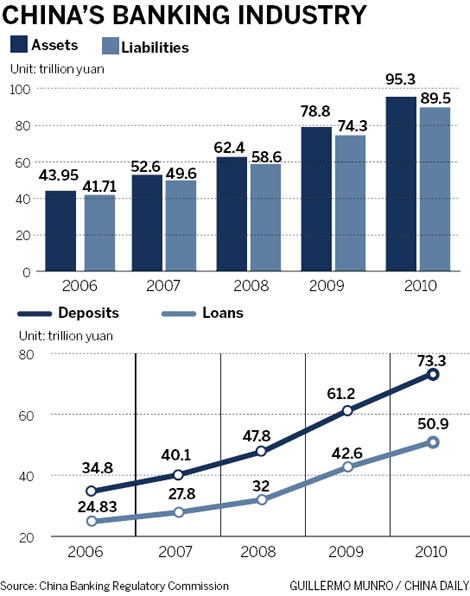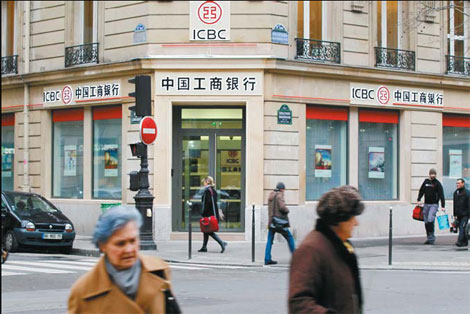Lenders take big step overseas
Updated: 2011-12-09 08:09
By Wang Xiaotian (China Daily)
|
|||||||||||
|
An Industrial and Commercial Bank of China branch in Paris. Chinese banks have been expanding in overseas markets as more companies from China are making outbound strides. [Photo?/ Agencies]?? |
Despite some setbacks, Chinese banks are determined to make outbound moves
Closer ties between Chinese banks and the international market that followed China's admission to the World Trade Organization (WTO) have increased the chances of the country's banks becoming major global players, analysts said.
Dong Xian'an, chief economist at Peking First Advisory Co Ltd, said Chinese banks have made progress in terms of asset quality, profitability and liquidity against the backdrop of rising competition after China joined the WTO in 2001.
For example, the non-performing loan ratio among commercial banks dropped from 17.9 percent in 2003 to 1.1 percent in 2010, he said.
"These improvements helped accelerate the expansion of Chinese banks into global markets, which will be a trend in the long term," said Dong.
Major lenders in the world's second-largest economy have increasingly explored global markets in recent years, especially after the financial crisis in 2007-2008, although they are still highly dependent on domestic business.
From the end of 2008 to the end of 2010, overseas assets of the Big Four banks - Industrial and Commercial Bank of China Ltd (ICBC), China Construction Bank Corp (CCB), Bank of China Ltd (BOC) and Agricultural Bank of China Ltd - have grown from 2.41 trillion yuan ($380 Billion) to 3.43 trillion yuan. And the number of their overseas institutions has increased to 1,212 from 959.
This year China tightened control over new credit, which contributed to the greater willingness of banks to explore overseas markets, said Guo Tianyong, director of the Research Center of the Chinese Banking Industry at the Central University of Finance and Economics.
"However, Chinese banks are still in the early phase of internationalization and lag far behind their foreign counterparts," said Hong Qi, president of China Minsheng Banking Corp (CMBC), a major private lender in the domestic market.
Hong said the capability of Chinese banks to take part in international competition requires universally applied rules, but this requirement has been somewhat restricted by complex and conflicting Chinese regulations.
It makes no sense if banks go overseas just for the sake of internationalization, regardless of their own strategies and capabilities, said Hong.
Minsheng learned a lesson, he said, after losing 900 million yuan in the acquisition of Wachovia Corporation.
ICBC, the world's biggest lender by market capitalization, announced earlier that it aims to draw 10 percent of its assets and profits from overseas operations by 2016, up from 4.51 percent in terms of overseas assets and 3.8 percent in profits at present.
"It is in line with our development strategy to expand overseas and diversify risks," said ICBC Chairman Jiang Jianqing.
This year, the bank has opened five branches in Europe, two in Pakistan and one in Mumbai, India. And it has applied to open new branches in Peru, Brazil, Cambodia and Laos.
At present, it has more than 220 overseas institutions in more than 30 countries and regions.
It also announced plans to acquire 80 percent of Bank of East Asia Ltd's US business for $140 million, and to buy an 80 percent stake in the Argentine division of South Africa's Standard Bank Group Ltd for $600 million.
BOC, another major lender, also vowed earlier this year to expand its overseas network, saying it expected to become a world-class bank by 2020.
The bank used to be highly dependent on services outside the Chinese mainland, before it began exploring the domestic market at a rapid pace during the past decade.
By the end of 2010, the lender's overseas revenue accounted for less than 20 percent of total revenue, and net profit overseas contributed less than 22 percent.
Li Lihui, president of the lender, told China Daily that a 20 percent contribution from overseas business would be a well-balanced ratio, given that the Chinese market is huge and growing very quickly.
During the first half of this year, the bank set up more than 20 institutions abroad.
But Chen Zuofu, vice-president of CCB, the world's second largest bank by market value, said CCB would give top priority to establishing domestic outlets in the next three years instead of heading into overseas markets as aggressively as some of its rivals.
The bank aims to increase the contribution of profits from overseas branches from the current level of more than 2 percent to an ideal level of 5 percent within five years.










